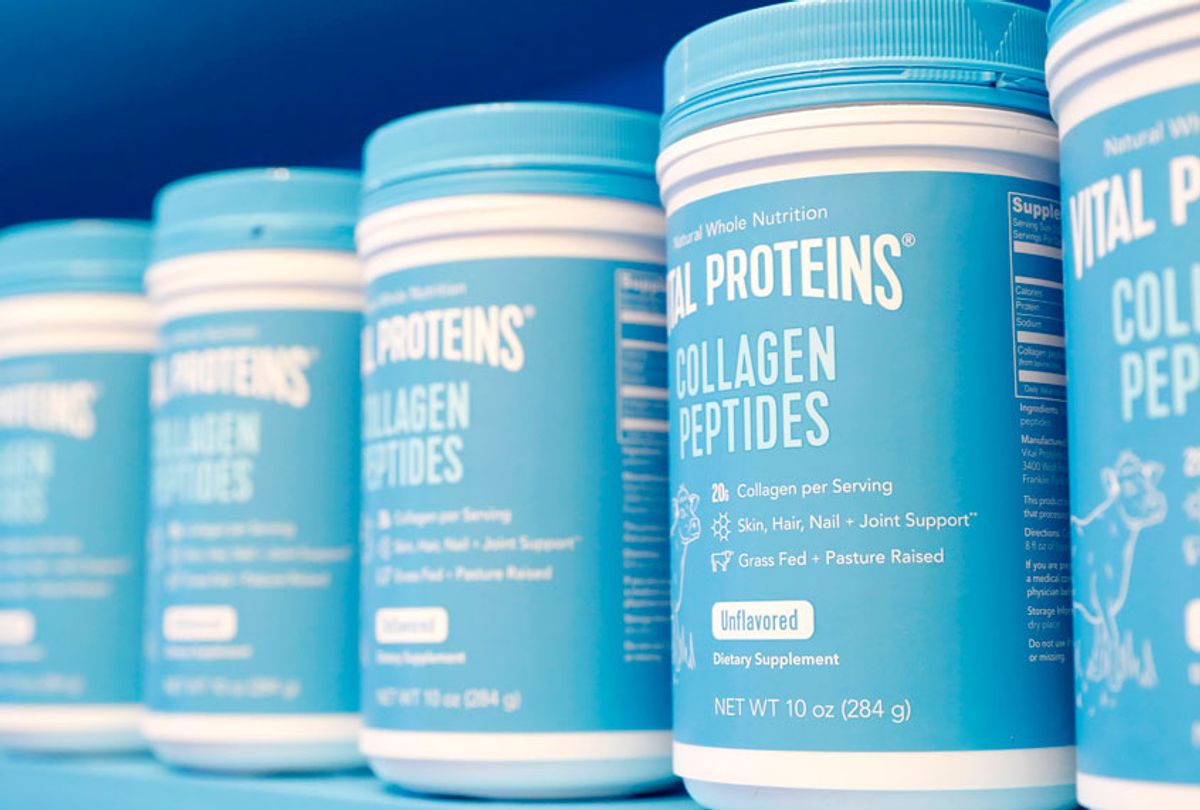Collagen, a protein that abounds in mammals, is plentiful in the human body: Yours and mine produce it every day in abundance. Now, a number of health bloggers, big food companies, and nutritionists are promoting the addition of collagen supplements, either as powder or pre-mixed into food, as the key to youth and vigor. But just like with any health fads, both experts and consumers are scratching their heads as to whether collagen is just the next variant of snake oil, or if there's real science behind the claims.
For the uninitiated, collagen peptides come in the form of powder and pills, and can be added to beverages, food or taken as a supplement. Such supplements are made from the cartilage, bones, and hides of cattle, chicken, and sometimes marine life, and reach their consumer-ready form after being soaked in an alkaline or acid solution, from which the collagen is eventually extracted. Final steps include evaporation and milling to reach powder form. The industry is booming in North America, who is currently dominating the market—although China and Japan are also experiencing a collagen craze. One industry report estimates that the collagen peptides market was valued at $716.5 million in 2017. It’s expected to grow to $1.34 billion by 2023. According to the report, “major factors driving the collagen peptides market in North America are the rise in health awareness among consumers and presence of key players.”
Collagen peptides promise youthful skin, shinier hair, stronger nails, joints and bones, thanks to being touted by health bloggers and celebrities who swear by it. Jennifer Aniston says she puts it in her morning smoothie. Last week, I, too, became seduced by their marketing while shopping at Whole Foods, browsing the rows of shiny blue collagen containers in the supplement section. A middle-aged man stood next to me. We didn’t speak, but like me, he stalled in the aisle for a length of time that suggested he too was engaged in an internal debate over whether to buy the $26 container.
The experience left me wondering if this supplement actually does anything — or if it, like many supplements, provides zero health benefits. Moreover, the packaging and branding made me wonder if collagen peptides were merely a way for protein powder companies — who generally market towards men — to target female consumers?
Answering the first question requires understanding what collagen is and how it works in the body. Collagen is the main structural protein the body and skin; it connects our tissues, joints, and provides protection, in addition to giving our skin firmness and elasticity. Our bodies naturally produce collagen, but that slows down with age — hence, wrinkles and cartilage breakdown being associated with senescence.
“Collagen supplements are popular right now, but when ingested [they] are broken down into component peptides or fragments by our GI [gastrointestinal] tract,” Dr. Joshua Zeichner, Director of Cosmetic and Clinical Research in the Department of Dermatology at Mount Sinai Hospital, told Salon.
“Some think that these peptides serve as messengers throughout the body to stimulate production of new collagen. Essentially, they fool the body into thinking that natural collagen has been broken down and as a result make more," Zeichner continues. "The true effectiveness is unclear, however there is little downside to using these supplements.”
Of the meager research that has been done on the topic, some small studies showed promise — though notably, some of those studies were funded by industry players with an interest in positive results. BioCell, a major manufacturer, funded a 2012 study published in Clinical Interventions in Aging which found a reduction in skin dryness and wrinkles in women who took 1 gram each day for 12 weeks. Aside from vanity perks, there were mixed results in a few studies of whether collagen peptides could help with osteoporosis.
Another study published in 2014 randomly selected 46 of 69 women, between the ages of 35 and 55 years old, to take a collagen hydrolysate supplements by VeriSol®. The remaining women in the group took a placebo. The women who consumed the collagen showed improvement in skin elasticity within four weeks, according to the study. Another study with the same supplement showed it significantly reduced wrinkles after just eight weeks. However, a scientific opinion by the European Food Safety Authority (EFSA) found flaws in the statistically small study, noting that “a cause and effect relationship has not been established between the consumption of VeriSol® and a change in skin elasticity leading to an improvement in skin function.”
Some medical professionals are convinced of collagen's efficacy. Dr. Taz Bhatia, author of "Super Woman RX," told Salon she thought that there was a biological explanation for how collagen peptides could promote health.
“Collagen peptides can help reverse aging by improving the integrity of the gut lining,” she told Salon. “This reverses aging by improving absorption of nutrients and can indirectly help skin and hair health.”
Yet not all collagen-peddlers are virtuous. There have been cases of the FDA recalling hydrolyzed collagen. Last year, the FDA issued a recall for Bulletproof Collagen Protein, because it was mislabeled and had undeclared milk content.
When asked if collagen was merely another instance of health corporations preying on society’s fear of aging, Dr. Bhatia demurred.
“I think there is a place for collagen peptides, but it may not be a magic bullet,” she said in an email. “Skin health, just like weight and so many purger conditions, always needs a personalized approach.”
As for me, I will continue to be a cautious, occasional consumer.



Shares